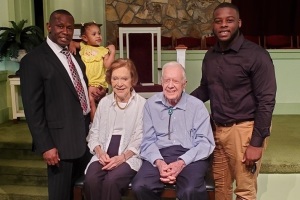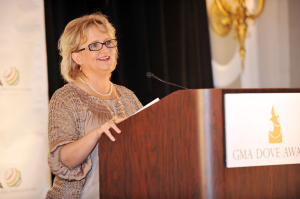Efforts to Aggrandize Missions in Russia Since 1992
DALLAS - For 10 years, United Methodists committed to the church's Russia Initiative have endured the infamous Russian bureaucracy. They've struggled with language barriers, traveled long and hard in territory that covers 11 time zones and stinging blizzard weather.
But almost 300 United Methodists who gathered Nov. 7-9 in Dallas for the 10th Russia Initiative Consultation affirmed that the struggle of making disciples, in a bastion of atheism, has been worth the financial and spiritual costs.
"It's been a rough journey," the Rev. Bruce Weaver, executive director of the Russia Initiative, told the gathering in Dallas.
Weaver recalled that one of the first things America's United Methodists did after the fall of communism was connect with the humanitarian-oriented Soviet Peace Foundation to send food and medicine into Russia during a food crisis. The SPF is now a non-profit Russia Peace Foundation, which still works faithfully with United Methodists.
Since then, the mission work in Russia has only become more difficult, Weaver noted, "there are more [Russian] bureaucratic hoops to jump through, more fees to pay."
The upside of the story is that the Russia Initiative - whose goal from the start has been to support the Russia United Methodist Church until it can become self-sufficient - "is moving beyond conflicts and problems," Weaver said.
"Thank God so many of you have stayed the course and worked through the struggles," he added.
The Rev. R. Randy Day, who will become top staff executive of the United Methodist Board of Global Ministries in January, noted that the Russia Initiative became the model for initiatives created in three other nations.
"It is from the Russia Initiative that we have learned how to organize other initiatives," Day said. "The Russia Initiative has done pioneering work."
Restructuring for growth
Speakers emphasized that the Russia Initiative's goal has been to make the Russia United Methodist Church indigenous, able to carry on without support from the American church if need be. Just as Methodists who ventured into Russia in the late 19th and early 20th centuries were forced out after the Bolshevik Revolution, those involved in the Russia Initiative today say Russia remains just volatile enough that American Methodists could some day be shut out.
For now, however, the Russian church is progressing. Bishop Ruediger R Minor, who has overseen Methodism's re-emergence in Russia and surrounding territories since 1992, recalled a time when the seed of the Russia United Methodist Church contained "one Russian ordained deacon and a lot of enthusiastic volunteers."
"We had no building, no churches, no members," he said. Minor noted that today the Russian church has about 5,000 members and preparatory members, almost 2,000 Sunday school students of all ages and a presence in five countries: Russia, Kazakhstan, Ukraine, Moldova and Belarus.
At the Russia Annual Conference gathering in September, the bishop made 127 ministry appointments to 110 congregations. Conference delegates also approved a decentralization plan that created four new annual conferences, with 11 districts, replacing the one conference that was always centered in Moscow.
Minor said the new structure will enable the people of the Russia United Methodist Church to "take ownership of decision making," and will make it "multinational" with the development of congregations in other countries such as Ukraine.
"To use an American expression, decisions will be made where the rubber meets the road - in the local churches," the bishop said. "Conferences will not just be for pastors anymore but for congregations. People in the churches and districts will look to themselves, not to Moscow."
The decentralization will concentrate local mission work in neighborhoods and will come with a new emphasis on stewardship, he said. "The goal is not a new layer of administration, but a new opening of our hearts and minds to be in mission, to strengthen and connect the ligaments, to grow up in every way in Christ."
Still, participants noted that the Russian church will rely for an undetermined amount of time on support from American churches and conferences through three means: the supporting congregations that provide financial aid; the "partner" churches that make a minimal two-year commitment to send two mission teams into the Russia territory and develop solid relationships; and through Volunteers in Mission, the program that dispatches teams for labor or humanitarian projects.
A child's evangelism
Instrumental in the 10-year building of the Russian church were the Rev. Jarrell Tyson and his wife Natalie, a missionary couple who spent seven years living with Russians in their homes and laying the groundwork for new congregations in what Mrs. Tyson described as "kitchen evangelism."
"The Russians didn't understand why there were these foreigners called Methodists coming in and showing love and respect for them," Mrs. Tyson said. "You showed respect for them and their customs and their Orthodox Church tradition, and not all denominations did. They became curious about this Methodist God, and then they came back because they believed."
The Tysons noted that by living with Russians they were able to absorb the culture and customs while teaching about God and the church in small groups and Bible studies. "They loved this thing we introduced to them called 'joys and concerns,'" Mrs. Tyson noted.
Jarrell Tyson recalled that a United Methodist Russian pastor once faced opposition in a village from its leaders.
"Then, a 9-year-old girl went to a summer camp where there were some Russian Methodists and some American Methodists," he said. "The girl had a great time and went home and began telling about her week at this Methodist camp.
"Adults in Russia listen to their children more than we tend to," Tyson continued. "The adults in the village learned from the girl that Methodists, whether they were Russian or American, were good folks. After that, all the opposition to the United Methodist pastor in the village fell off. The village administrators welcomed the Russian pastor.
"It's all because of work done by people like you, who impressed a 9-year-old girl," Tyson told the consultation participants.
The consultation hosted 11 Russian pastors who traveled to Dallas to share their own joys and concerns. Most of them noted that they had grown up under communism and consequently had little or no knowledge of God, Christ or the Bible, and in some cases had been hostile to Christianity. They said they had no idea what a Methodist was until they encountered the people called Methodists.
The Rev. Alexander Merzylakov, pastor of the United Methodist church in Lugansk, Ukraine, said his mother bought a Bible for him to read as a "cultural or history book" in the early 1990s. "I didn't want to read it, but she pressed me.
"Thank God for mothers!" he quipped.
Merzylakov noted that the Bible reading eventually led him to the joy of life in Christ. "After reading the Bible, I was filled with great joy and peace," he said. "And this Bible my mother made me read came from a Methodist church. So I've thought of myself as a Methodist from the beginning."
Seminary support
In other business, participants learned that students at the Russia United Methodist Theological Seminary in Moscow may soon get relief from the cramped rental space that has been the seminary's home since its establishment in 1995, a facility so tight that it has no room for a sanctuary, library or computer lab.
Restoration is finally under way on an old but spacious, three-story, kindergarten building that was purchased to house the seminary and a Methodist center years ago, only to get wrapped in the red tape of 130 building permits.
Bishop Marion Edwards of the denomination's Raleigh Area noted that more than $2 million has been raised in the ongoing $4 million fund-raising campaign for the renovation and for an endowment to sustain the seminary.
Other Russian pastors and American Methodists told of the social ills that still plague the former Soviet Union, where the No. 1 cause of death is alcoholism and where, because of the drinking problem, the life expectancy of men is age 57. Consultation participants also were reminded that the death rate is far exceeding the birth rate in Russia, a fact that could have serious ramifications in the future.
For more information on how individuals or congregations can support the Russia Initiative or the Moscow-based seminary, contact the Rev. Bruce Weaver at (214) 273-0330 or by e-mail at rbw101@aol.com. The fax number is (214) 273-0332. The Russia Initiative Web site is at blank>GBGM
By Albert H. Lee
editor@chtoday.com




























